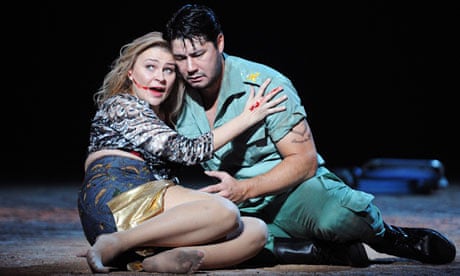Sunlit dust hangs in the air. A half-vandalised "teléfono" stands to one side of the empty stage. A lounge lizard in grubby white suit, bottle in hand, staggers in and performs a banal trick with a red silk handkerchief. Within moments of the curtain rising and with minimal gesture, Calixto Bieito has thrust us into a seedy, alien no man's land, quickly identified as a place in which the Spanish military hold sway. Soon the stage swarms with muscular young men in khaki, one wearing only underpants. They hoist a red-and-yellow "bandera" up the flagpole where, by some feat of technical ingenuity, it flutters in the windless air.
This was the eye-catching opening to English National Opera's Carmen, new to the UK but seen in several European cities since its premiere in 1999, and available on DVD. Bieito's reputation precedes him like naked drum majorettes ahead of a priest. He has long been singled out as the wild man of opera, as if there were no others. Yes, he has trampled on taste. Who could not be offended, or mildly disgusted, by a row of defecating conspirators, his curtain-raiser to Verdi's Un Ballo in Maschera, also seen at ENO. His stark Shakespeare odyssey Forests, at the Barbican this month, offers no easy road to benediction. Its destination is the flames of hell.
By contrast, the quietly spoken man who was interviewed on Radio 3's Music Matters last week sounded incapable of entertaining an ugly notion. Indeed, it was hard to find any of the harsh, brutal specifics for which the Catalan director is famed in his tender ramblings about "the love", "humanity", "universe" and "the nakedness" which are the qualities he finds in opera. This Carmen is intelligent, persuasive and intense. It is updated to the 1970s and the dying days of Franco. The cigarette-factory girls are, in their way, as violent as the men. The physicality of the chorus, not to mention their great singing, is central to the restless mood of the production. The entire mise-en-scene, designed by Alfons Flores and lit by Bruno Poet, captures the vanishing certainties of old Spain, and has a cinematic quality we know from Almodóvar.
It's tempting to relate every knot and twist in Bieito's approach. To concentrate on the music, Ryan Wigglesworth was superb as conductor. He ignited the performance with a fiery prelude, vigorous, pacy and febrile, as well as expertly played. Mouthing every word of Christopher Cowell's translation, Wigglesworth had a close rapport with his cast, even though not all were in top voice. The Coliseum stage is huge and even strong voices need help. But ENO's composer in residence – yes, he's another of those versatile pianist-composer-conductor types – kept a tight rein on orchestral volume. Special praise is due to the bassoon, clarinet, flute and oboe solos at the start of Act II.
Leigh Melrose, at first resembling Ol' Blue Eyes in suit and hat then transforming into a macho bullfighter, was secure as Escamillo. The American Adam Diegel as José, tall and sturdy, looked the part of Carmen's latest love victim and conveyed perfectly the pent-up anger of a feckless man who – we know from the original Merimée novel, but not the libretto – has already committed a murder. After a quavery start, Diegel rose to the challenges of Acts III and IV. Micaela, the girl he left behind, here turns out to have guts and bad-girl passion. Elizabeth Llewellyn, an ENO Harewood Artist, offered the best singing of the evening in the role and was warmly applauded.
The Romanian mezzo Ruxandra Donose, making her ENO debut and singing in heavily accented English, played Carmen as both icy and hot, fickle and confused. She desires all and nothing. Her "dance" is a bodily encounter with a saloon car. She swivels her hips with the driver's door between her legs till her own chassis, splayed out on the roof, says come and get me. Poor horny José does just that. You need to see this great show for yourself – though its slashing of so much dialogue will be a jolt for purists – if only to relish José scattering the contents of Carmen's handbag then kicking it out of sight. Show me a man who hasn't had that same urge.
Most weeks, the UK's conservatoires stage new music concerts, usually free, to train students in the hard art of contemporary repertoire. The Royal Academy of Music's Manson Ensemble, working with conductor Elgar Howarth, performed an evening of works by Harrison Birtwistle, plus a world premiere by David Coonan (b1987). Two Sarcasms, inspired by Prokofiev, mixes attractive lyricism with sardonic spikiness, skilfully written if not yet quite distinctive in style.
Birtwistle's recent Fantasia upon all the Notes (2011), for flute, clarinet, harp and string quartet, created a fresh, original sound by exploring the textural as well as song-like possibilities of stringed instruments, and using the pedal action of a harp – which changes the pitches of the strings – to beguiling harmonic effect. It was written for the Nash Ensemble. It should be obligatory for music critics to point out that this group has commissioned more than 175 new works since its foundation in 1964. It plays the old ones pretty well, too. On Sunday, at a sell-out Wigmore Hall, its performance of Mendelssohn's Octet had me holding my breath for the entire 35 minutes' duration. That's only a slight exaggeration.

Comments (…)
Sign in or create your Guardian account to join the discussion